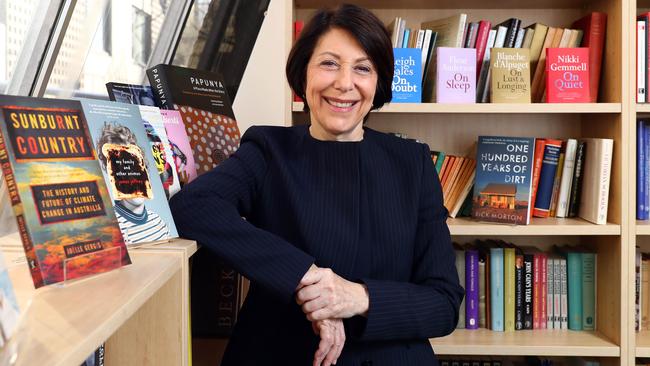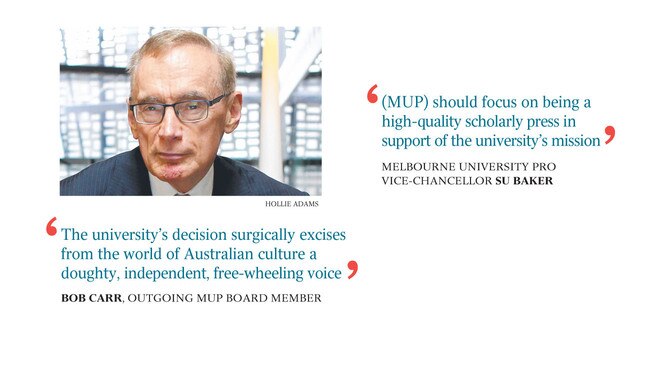Battle of the books: MUP loses its spine as chief executive, directors quit
A high-stakes power struggle has culminated in Louise Adler quitting as chief executive of Melbourne University Publishing.

A high-stakes power struggle within two of Australia’s most important cultural institutions has culminated in Louise Adler quitting as chief executive of Melbourne University Publishing and raised doubts over the financial viability and editorial independence of the century-old publishing house.
Ms Adler, an entrepreneurial publisher who turned MUP into the leading imprint for Australian political memoirs, contemporary history and serious nonfiction books, announced her resignation to staff yesterday and those of five independent directors after the University of Melbourne directed her to limit the company’s focus to academic works.
The MUP exodus, which saw former NSW premier and foreign minister Bob Carr and former human rights commissioner Gillian Triggs also quit the board, came after Duncan Maskell, the university’s newly appointed vice-chancellor, directed MUP to cease trade publishing and announced that a new editorial advisory board would be created to determine what books would be published.
Laurie Muller, the most recent chairman of MUP and for 20 years the general manager of University of Queensland Press, also quit the board, along with PwC executive Tony Peak and businessman Danny Gorog. Mr Muller said he did not believe the new strategy would be financially viable and the reduced editorial independence had left Ms Adler no option but to quit the publishing house she had led since 2003.
Under the proposed new direction, books such as Paul Kelly’s Walkley-winning Triumph and Demise, Tony Abbott’s political manifesto Battlelines and Bill Shorten’s latest memoir would not be published by MUP.

“Purely scholarly titles have by definition a limited market,’’ Mr Muller said. “A good one might sell 1000 copies. It is uneconomical. You need a parallel range of serious books to generate commercial revenues.’’
Some of Ms Adler’s more controversial publishing decisions raised eyebrows at Melbourne University: most notably The Latham Diaries; an autobiography of Melbourne underworld figure Mick Gatto; and Killer Instinct, a book by forensic psychiatrist Donald Grant last year referred to Queensland’s Crime and Corruption Commission for disclosing private details about murder victims.
Mr Carr said the university was turning a proud and successful publisher into a “pocket-sized and cloistered publisher of academic scripts’’.
“The university’s decision surgically excises from the world of Australian culture a doughty, independent, freewheeling voice that brought into print major works on the Australian people, their character and their challenges,’’ Mr Carr said. “It’s not a viable model to restrict this publisher to the works of scholars only, and it leaves a board like ours with no contribution to make.’’

Ms Triggs also questioned the financial viability of the shift, which appears to be an attempt to adopt the business model of leading university publishers in Britain and the US.
“It remains to be seen whether the new policy will be successful,’’ Ms Triggs said.
University of Melbourne pro vice-chancellor (engagement) Su Baker said the university would continue to provide significant annual funding to assist with publishing high-quality works.
She said MUP was “an outstanding asset which should focus on being a high-quality scholarly press in support of the university’s mission”.
Ms Adler and her MUP board were blindsided by the proposed changes, which were presented last month by Professor Maskell to Mr Muller as a fait accompli.
Although a review of MUP by the university had recommended the publishing house explore the possibilities of publishing more academic titles, it did not advocate exiting all trade publishing.
The Australian revealed in July that a rift had opened between Ms Adler and University of Melbourne chancellor Allan Myers QC over MUP’s decision to publish a highly critical book about one of Mr Myers’ former clients.
Mr Myers, a prominent Liberal Party donor, privately savaged the decision to publish the book in a meeting with then MUP chairman Peter McPhee.
After Mr Myers raised his concerns, Mr McPhee and Ms Adler were called before the University Council, which Mr Myers chairs, and questioned about the finances and editorial priorities of the publishing company, which is wholly owned by the university. That exchange resulted in the council placing MUP under review.
The MUP board, which in 2017 recorded one of its best trading results — $1.2 million in the bank and a small profit — believed it had weathered the storm. However, when Professor Maskell, headhunted by Mr Myers from Cambridge University, replaced outgoing vice-chancellor Glyn Davis, he arrived in Parkville with a plan to overhaul MUP. It is understood that when MUP’s independent directors pushed back against the changes, they were told to consider their positions.
In a statement confirming her resignation, Ms Adler described MUP as Australia’s “foremost publisher of serious nonfiction’’.
She paid tribute to the support of Professor Davis and said books that MUP had published had “set the agenda, changed community attitudes, altered public policy, held the powerful to account and defended the disempowered’’.
Mr Myers said the University Council had taken a unanimous decision to change the direction of MUP and it was appropriate for the board to resign. He denied the decision was shaped by his animosity towards the book about his former client.
“My own views about the … book I’ve never expressed to anyone except privately within my family,’’ he said. “I don’t know how this board member who is using the cloak of anonymity could claim to know what I thought about the book. I have never said any such thing in any council debate or any discussion concerning Melbourne University Press.’’
It is understood authors under contract to write books for MUP were unaware of the changes until yesterday.
Mr Muller said Ms Adler had provided leadership within the publishing industry in Australia and internationally. He said university publishing in Australia was not comparable to Britain and the US, where leading academic publishers were backed by large, private endowments and sold into a far bigger market.
The remaining MUP board will be led by interim chair Warren Bebbington, who chaired the MUP review. Board member Richard Tegoni was announced as acting chief executive.
Disclaimer: Chip Le Grand is the author of The Straight Dope: The Inside Story of Sports Biggest Drug Scandal, published by MUP.



To join the conversation, please log in. Don't have an account? Register
Join the conversation, you are commenting as Logout